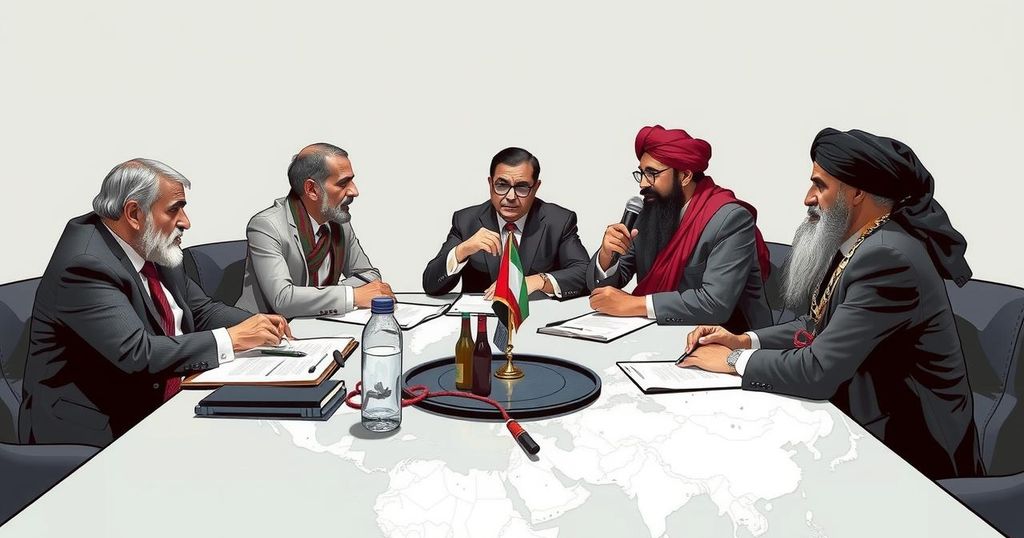Israel is under persistent missile and drone attacks from Iran-backed Houthi rebels in Yemen, complicating military responses. Despite Israeli retaliations, the Houthis’ aggression maintains due to substantial Iranian support, which includes advanced weaponry and training. The Houthis’ actions jeopardize critical maritime routes, and effective counter-strategies necessitate addressing Iranian involvement to mitigate ongoing threats to Israel and international trade.
Israel is currently grappling with an upsurge of missile and drone attacks from the Iran-supported Houthi rebels in Yemen. Israeli military responses, including retaliatory strikes, have failed to deter this aggression, as the Houthis benefit from extensive Iranian sponsorship, access to advanced weaponry, and military training. The Houthis’ strategic activities threaten critical maritime routes, especially in the Bab al-Mandab Strait, endangering global trade and security.
The Houthis, also known as Ansar Allah, have disrupted shipping operations by targeting commercial vessels, prompting significant rerouting of maritime traffic. Despite efforts by a US-led coalition, including the launch of Operation Prosperity Guardian, the disruptions continue unabated. The Houthis have fired over 200 missiles and 170 drones at Israel, resulting in Israel conducting extensive retaliatory strikes on key facilities.
The geographical and operational challenges posed by Yemen’s terrain and the Houthis’ deep-rooted community integration complicate intelligence and military efforts by Israel and the US. The Houthis have also benefitted from Iran’s military support, which has transformed them into a sophisticated fighting force since 2014, enabling complex operations against military and civilian targets alike.
Iran’s provision of advanced missile systems, drones, and extensive naval capabilities, alongside significant training initiatives, has significantly enhanced the Houthis’ operational effectiveness. With the support of the Islamic Revolutionary Guard Corps (IRGC), the Houthis are now enabled to launch sophisticated attacks aimed at Israeli territory, rendering them a formidable regional power.
To effectively counter the Houthi threat, it is crucial to adopt a strategy that targets the Iranian regime itself, as their support is integral to the Houthis’ operational capabilities. Absent direct action against Iran, the Houthis will continue to pose a substantial risk to Israeli security and global maritime traffic. Therefore, addressing the underpinning support provided by Tehran must be a priority in any strategic response.
The Houthi rebels in Yemen, backed by Iran, are increasingly launching missile and drone attacks targeting Israel, complicating regional dynamics. As the Houthis act as a proxy for Iranian interests, Israel’s response has included extensive military operations, yet these have not mitigated the Houthi threat. Yemen’s geographical isolation complicates intelligence operations and presents distinct challenges compared to conflicts in Gaza or Lebanon. Iran’s support has been crucial in enhancing the Houthis’ military capabilities, undermining the effectiveness of both local and international military efforts against them. With significant military hardware and training from Iran, the Houthis have evolved into a significant threat to regional stability and security, especially concerning vital shipping routes.
The ongoing conflict involving the Houthi rebels illustrates the complexities and challenges faced by Israel in the region. Despite Israeli military responses, the support provided by Iran is critical to the Houthis’ resilience and efficacy in military operations. To effectively counter these threats, Israel must consider a strategic approach that addresses the core issue: Iran’s involvement and support for the Houthis. Direct action against Iranian assets and influence is imperative to diminish the Houthi capacity to disrupt both regional security and global trade routes.
Original Source: www.jpost.com






